Haven: Survivor Support in the Era of COVID
Since opening its doors in 2016, Haven has served as Colgate’s sexual violence response center, providing survivor-centric, trauma-informed support. Founded in response to protests surrounding Colgate’s inadequate conversation around, and resources for, sexual violence prevention, Haven seeks to support survivors as they navigate their individual healing processes. Imperative to Haven’s philosophy is approaching the healing process through an intersectional lens that recognizes the ties between sexual violence and other forms of oppression. According to its mission statement, Haven seeks to empower students to “define their individual experiences and healing process” by upholding survivor-centric practices.
“We believe survivors. We consider how traumas affect survivors and what they are struggling with as a result,” Dawn LaFrance, Colgate’s director of Counseling and Psychological Services, said. “We are not here to judge; rather, we here to support and place our focus on the survivor. We consider how a survivor is thinking about their trauma and how we can help them heal.”
According to LaFrance, as an organization focused on survivor support, Haven remains separate from judicial processes, but supports survivors as they navigate whichever process is right for them. Junior Mackenzie Harrison, Haven’s student intern, emphasized how Haven’s independence from legal processes fosters its survivor-centric philosophy.
“Our staff serves as confidential resources to students, meaning that we don’t have to report anything to the University. We never make decisions for survivors, nor do we pressure them to make certain decisions,” Harrison said. “We know that healing looks different for everyone, so our goal is to empower survivors to make the choices that are best for them and to support them as they do so.”
Haven Fellow and senior Jailekha Zutshi echoed Harrison’s acknowledgment of the various forms of healing, including somatic healing processes that seek to relieve symptoms of trauma by focusing on an individual’s body sensations.
“We don’t want to take away or harm their agency even more than it already has been… What comes with that is having a wide variety of options available for healing,” Zutshi said. “For instance, not everyone wants to do therapy, so we’ve had crystal workshops. I reached out to a person who makes sex-positive and trauma-informed sex toys… specifically for survivors who are trying to reintroduce sex into their lives.”
At the heart of Haven’s philosophy is an understanding of the ways in which intersections of different identities impact sexual violence and traumatic experiences. According to Harrison, all Haven staff members and volunteers participate in extensive training about intersectionality and how different identities affect an individuals’ risk of encountering violence.
“Haven has a mission with a social justice focus,” LaFrance said. “We educate ourselves and focus our professional development on understanding diverse populations. We acknowledge our own biases to make sure that we are able to consider how others’ experiences are different from our own.”
Traditionally, Haven offers in-person counseling services in the comfort of staff members’ offices, but in response to COVID-19 social distancing regulations, the organization has had to adapt their support services.
“We are offering all of our programs remotely. The only time that we will meet with a student in-person is in an emergency and this will be done in a safe way, putting the health of the student and the staff member first,” LaFrance said. “We provide both individual and group telehealth services and our demand has been consistently high as we have seen in years past.”
In order to maintain client confidentiality while working with students digitally, LaFrance explained that Haven collaborated with ITS to secure a HIPAA-compliant Zoom platform on which all appointments are held. Since transitioning to almost entirely remote appointments, Haven has prioritized fostering a digital presence to provide students with support and information.
“Shameless plug: follow us on Instagram!” Harrison said. “I’ve been working really hard to use the platform to ensure students still have access to information and resources despite the limitations caused by the pandemic.”
Although Haven has expanded its digital appointment availability in response to COVID-19 guidelines, staff members eagerly anticipate returning to in-person meetings when regulations permit it.
“Post-pandemic, we are looking forward to going back to in-person counseling in the comforts of our offices,” LaFrance said. “We may still conduct some remote support services since we have learned the benefits of these services, but we will likely go back to the traditional way of meeting.”
Whether working digitally or in-person, Haven’s priority remains supporting and honoring survivors. Until in-person meetings resume, Haven is continuing to adapt its digital services to best empower survivors.
“Even though there might not be [programming] coming out of Haven specifically, we’ve been highlighting other resources like Help Restore Hope [An organization that provides free and confidential services to those affected by sexual assault or domestic violence in Madison county],” Zutshi said. “And now we’re doing a lot on our social media and trying to do workshops with athletes, but it’s still very much an evolving process.”
Follow Haven on Instagram: @havenforsurvivors









